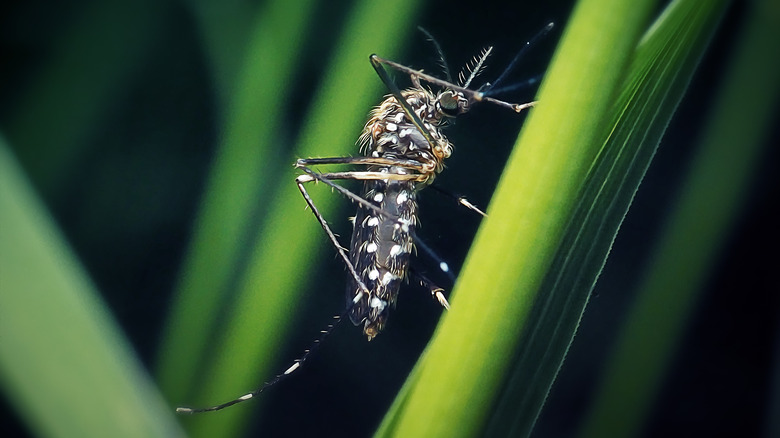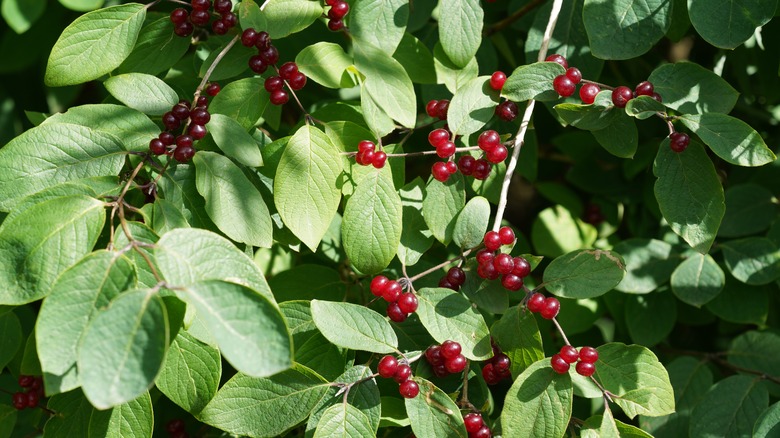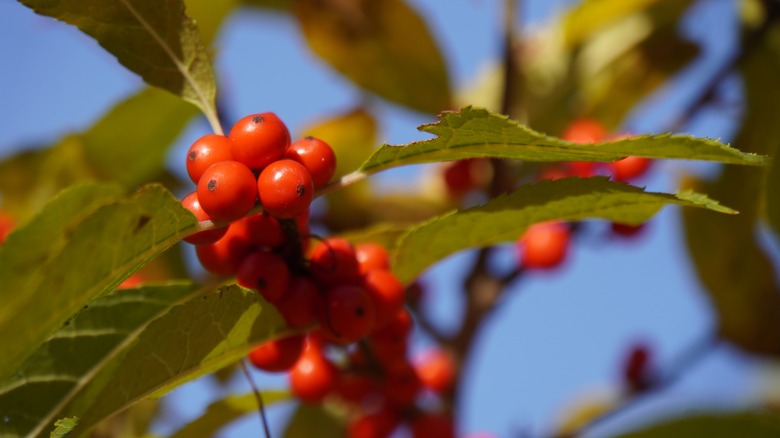The Mosquito-Attracting Shrub To Avoid Growing In Your Garden At All Costs
There are few things less pleasant than a yard teeming with mosquitoes. You might think that as long as you're vigilant about not leaving standing water and you don't let your grass get too long, you've done your part to deter these pests. Unfortunately, while there are indeed some mosquito-repellent plants, other plants can actually attract mosquitoes. One such–and especially problematic–plant is Amur honeysuckle, an invasive, shrubby honeysuckle species that is known to be a magnet for mosquitos.
You may already know to avoid certain popular and invasive vining honeysuckles, like Japanese honeysuckle. However, it is equally as important to avoid growing invasive bush honeysuckle varieties, like Amur honeysuckle (Lonicera maackii), as well. In addition to attracting mosquitoes, this plant outcompetes native species and forms dense thickets where little else can survive or grow. It's no surprise then that in many states, it, like other invasive honeysuckles, is already categorized as a noxious weed, making it illegal to sell or transport.
Honeysuckles' relationship with mosquitoes
It might be surprising, at first, to learn there is a connection between Amur honeysuckle and mosquitoes, but research at The University of Dayton found that the flowers of honeysuckles are full of nectar many adult mosquitoes require. Additionally, these flowers are available far earlier in spring than many other flower species. The leaves and flowers of Amur honeysuckle also drop and decay quickly, helping to provide ideal habitats for larvae to grow. This is especially alarming considering that the mosquitoes specifically looked at in this study were Culex pipiens, which are the primary vector for the West Nile virus in parts of the United States. Not only does Amur honeysuckle give mosquitoes an ideal place to lay their eggs, but it also seems to give those eggs a higher chance of surviving.
In more positive news, a study published in the journal Ecohealth found that removing Amur honeysuckle reduced the population of mosquitoes in the area, including some mosquitoes that are common disease vectors. Researchers found that while dense thickets of Amur honeysuckle created an ideal microclimate for mosquitoes, this was reversed once the invasive plant was removed and mosquito numbers decreased. Removing Amur honeysuckle also appeared to lower the density of birds in the area, which may be seen as a positive as birds are often hosts of viruses like West Nile that mosquitoes then pass to humans.
Identifying, removing, and replacing invasive honeysuckle
There are several ways to tell if the honeysuckle growing in your yard is native or invasive, but one of the easiest ways is to simply break off a stem. Invasive honeysuckles have hollow stems, while native varieties have solid stems. Additionally, the leaves of invasive honeysuckle species do not turn red and gold in autumn the way native varieties do. If you've confirmed that the honeysuckle you have growing is invasive, then your best option is to remove the invasive plant species from your lawn and garden. If you aren't able to fully remove the plant by digging or pulling it out, then cutting it back as much as possible and painting the cuts with herbicide is also an option.
Once you've removed your invasive honeysuckle entirely, your garden or landscape may look a bit bare. Luckily, many wonderful native shrubs can replace it, including Northern bush honeysuckle (Diervilla lonicera), which is hardy in zones 3 through 7 and can thrive in both sun and shade. New Jersey tea (Ceanothus americanus) is another fantastic native option that thrives in zones 4 through 8, can handle both sun and part shade, and is adored by pollinators. The native spicebush (Lindera benzoin) could also do a great job replacing your invasive honeysuckle, as it, too, is a shrub with beautiful fruits and flowers. Spicebush is hardy in zones 5 through 9 and grows well in part shade.


